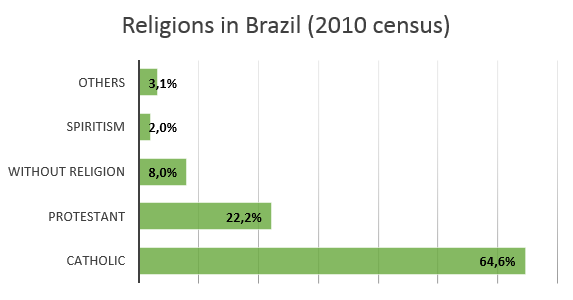Most Brazilians who believe in spiritism might ignore the fact that Allan Kardec is almost unknown here in France and that his real name is Hippolyte Léon-Denizard Rivail!
Actually, those statements are not based on actual statistics, but only on questions asked around here (in France) by me, to see if there was anyone who knew Allan Kardec and the tenets of spiritualism here, as so many of us do in Brazil.
To my surprise, all the answers that I could find were conjugated with a grin:
What are you telling me? What are you talking about?
So it comes down to it, Hippolyte Léon-Denizard Rivail, known primarily as Allan Kardec: A French citizen born on October 3, 1804 in the city of Lyon. The undisputed father of the spiritualist movement, spread mainly in Brazil, and the founder of the spiritualist doctrine: How is it possible that you have not heard of him? There is a religion in Brazil that is established on everything that this French guy has said, written, drawn, prophesized, etc.…
Well, for me, as with 99% of the Brazilians, I believe in God or something more (yes, God with a capital G, please! I’m talking about the Actual one, then we must be careful with what is said of Him, to no risk blasphemy!)
It is interesting to note that one of the first differences between Brazilian and French that I’ve noticed fairly quickly is about the lack of relationship that the French seem to have with religion.
It is ironic to think that in this country where you can find some of the most beautiful churches in the world, such as Notre Dame or Sacré Coeur, the French people seems curiously to have almost no religious activity.
It seems to me that activities such as going to Mass, going to the “spiritist center” for “dispossession”, following a mediumship course or “glorifying God” until exhaustion are definitely part of a culture alien to the French.
And I just started to realize that in my discussions with people around here, when I employ direct translations of very usual Brazilian expressions, like: “See you tomorrow, God willing! Oh, thanks God! And thanks be to God! Oh my God!” that’d be followed by a grin of my disturbed French friends, as if they were saying: “What the hell are you talking about? ”
Well, it took me a while for me to understand that here we do not speak “protestantese”, “chatolicese”, “spiritese” nor any of that! (I’m talking about the kind of “dialect” that one absorbs when starting to frequent a religion or sect).
The French do not have the habit of attributing to the heavens the good things that happen to them, and their misfortunes are not attributed to the devil or an evil spirit as well. They are a pragmatic people, who have think as a habit and ask themselves lots of questions before trying to understand a phenomenon or settling with a single answer.
 If you allow me to insist with my imaginary statistics, I would say 99% of people here are agnostics or atheists, while 1% are religious who almost never attend church (catholic of course), because even if Hippolyte was precursor of spiritualism in Brazil, here you can forget about this story! Because of all his notoriety in Brazil, very little remains here inside French borders. And, in 6 years, I’ve never seen a spiritist center in Paris. If you know about one, tell me please, because I am curious to see!
If you allow me to insist with my imaginary statistics, I would say 99% of people here are agnostics or atheists, while 1% are religious who almost never attend church (catholic of course), because even if Hippolyte was precursor of spiritualism in Brazil, here you can forget about this story! Because of all his notoriety in Brazil, very little remains here inside French borders. And, in 6 years, I’ve never seen a spiritist center in Paris. If you know about one, tell me please, because I am curious to see!
Even if my statistics are imaginary and come rather from chronic laziness of searching real figures on the distribution of religions in France, not all is lost for me! So, I found some estimates, as here in France we are in a secular republic, and religions can’t be part of the census (I will develop better this subject about the French Republic in a upcoming article). Here are a few different estimates of the distribution of religions in France:
Religions in France
| Source (year) | Christianism | Without religion | Islam | Judaism | Others |
|---|---|---|---|---|---|
| CSA (2012) | 58 % | 32 % | 6 % | 1 % | 3 % |
| Ifop (2011) | 65 % | 25 % | 7 % | 1 % | 2 % |
| INED (2008-2009) 18-50 ans | 45,5 % | 45 % | 8 % | 0,5 % | 1 % |
| CIA World Factbook (?) | 85-90 % | 4 % | 5-10 % | 1 % | |
| State department (2012) | 65-66 % | 21 % | 8-10 % | 1 % | 2-4 % |
| Pew Research Center (2010) | 63 % | 28 % | 7,5 % | 0,5 % | 1 % |
Wait! When I told you at the beginning of this text that 99% of Brazilians are believers, again it was a statistical release of my imagination.
In any case, in respect to the very small group of Brazilian agnostics and atheists (of which my husband makes part), I’ve allocated at least 1% of my imaginary statistics.
Fortunately, a little out of curiosity and a little as another attempt to give a bit of seriousness to this post, I‘ve found a census of religions made by the Brazilian state, which oddly also calls itself a secular republic. Wonderfully crazy!
So here is the break-up of religions in Brazil in 2010, as found on Wikipedia:
For the better or for the worse, we have more people in our country believing in everything and anything in terms of religion (92%), while in France the high estimates for non-believers reach 45%, which seems plausible in my opinion.
Finally we come to the point that interests me most about this POST: Why do we find so many churches in Brazil? Why so many believers, catholics, protestants, macumbeiros (people who believe in voodoo) and so much people with so much faith? Besides that, what is FAITH? Do any of you have ever looked this word in the dictionary? I did that today!
Here is a transcript of the definition of “FAITH” found in my beautiful Larousse Illustrated 2014 (French dictionary)
WITNESS N.F. (from the Latin fides, trust). 1.RELIG: Belief in God, a dogma; religious doctrine. 2 Confidence in someone or something. I have total faith in her faith in it or in this policy. 3. Litt. Commitment that we take to be faithful to a promise violate the faith of friendship. Good faith (dr), mistaken belief in the existence of a law or a rule of law, through ignorance or deception following: Housed in good faith; attitude of someone who speaks or acts with the conviction to be honest, to respect the truth. To faith, establish indisputably; prove: the postmark shall prevail. Lubber line (opt) line in an optical instrument, used as a benchmark to observe accurately. My faith to support a formula usitée About: This is my true faith! Have you warned – Well no, I forgot. Bad faith, dishonesty of someone who says things he knows to be false. Lawless, without religion or respect for human life.
And here is the translation of my dear Aurelio 1994 (Brazilian dictionary), which I keep with care:
(And yes, your blogger likes dictionaries!)
WITNESS N.F. 1. Religious Belief. 2. Assembly dogmas and doctrines that constitute a cult. 3. Rel. First theological virtue membership and personal consent to God, his designs and events. 4. Firmness in the execution of an undertaking or recognizance. Belief, trust. 5. 6. Affirmation of fact. 7 that some officials provide written about some of the acts that force in a judgment authentic approval.. PUBLIC FAITH: legal presumption of authenticity, truth or legitimacy of an act emanating from an authority or a duly authorized, in the exercise of their official functions. ACTION BY FAITH. 1 assert as true.; certified. 2 Achieve, by statutory charge, the truth or authenticity of the content of a document or report.; wear by faith. HOW FAITH: 1 Be worthy of trust 2 LOAN APPROVAL AUTHENTIC… Porter by faith: Giving faith.
But why all this talk that began with Allan “Hippolyte“ Kardec, passed through my perception of religion in France and in Brazil, the presentation of estimates of religions in France, the census of religions in Brazil and came to a look up in the dictionary of the word “faith” on a French and a Brazilian Portuguese dictionary?
Well, let’s say that this cultural trip aims to bring the reader (mainly Brazilian I guess) to think about the strengths and weaknesses that FAITH brings in itself.
Strengths because (at least in Brazil) one who has faith goes far, does not get discouraged, does not let things fade easily, because faith nourishes his heart and heals his wounds caused by the injustices of this life, we all hope through faith, thru God, the Holy Virgin, the “caboclo” (candomble entity), spiritual mentors, the guardian angel or any other entity that is there to be believed, that we will find the strength that we wouldn’t have otherwise, if we didn’t have faith.
However, the greatest weakness in having FAITH is that we are taught that we are powerless in face of life. Because one may have heard the promise of God during worship or mass, where He promised release and does not require you to do anything but wait for him to act in your life. Or else because you ordered a sort of voodoo sorcery from that will help you find a job. Or still because you haven’t paid your promise to pray and fast for a whole day if you could have your driver’s license. At this point, faith paralyzed you.
This is the biggest difference between Brazilian and French: while Brazilian have faith and expect that God will come to their aid, the French cut off the head of their king and queen in 1793.
Here in France, we do not expect things to fall from the skies. The French come together and protest until they get what they want. It is a people with an incredible character (I’ll write on another post, about an example concerning an environmental tax rejected by them to illustrate what I just told you).
To conclude: Brazilian Faith is pure, beautiful and naive, but unfortunately it makes the people enslaved by religion. We still hope that God or another entity will come to do our bidding and liberate us, but in reality only we can release ourselves one day.



